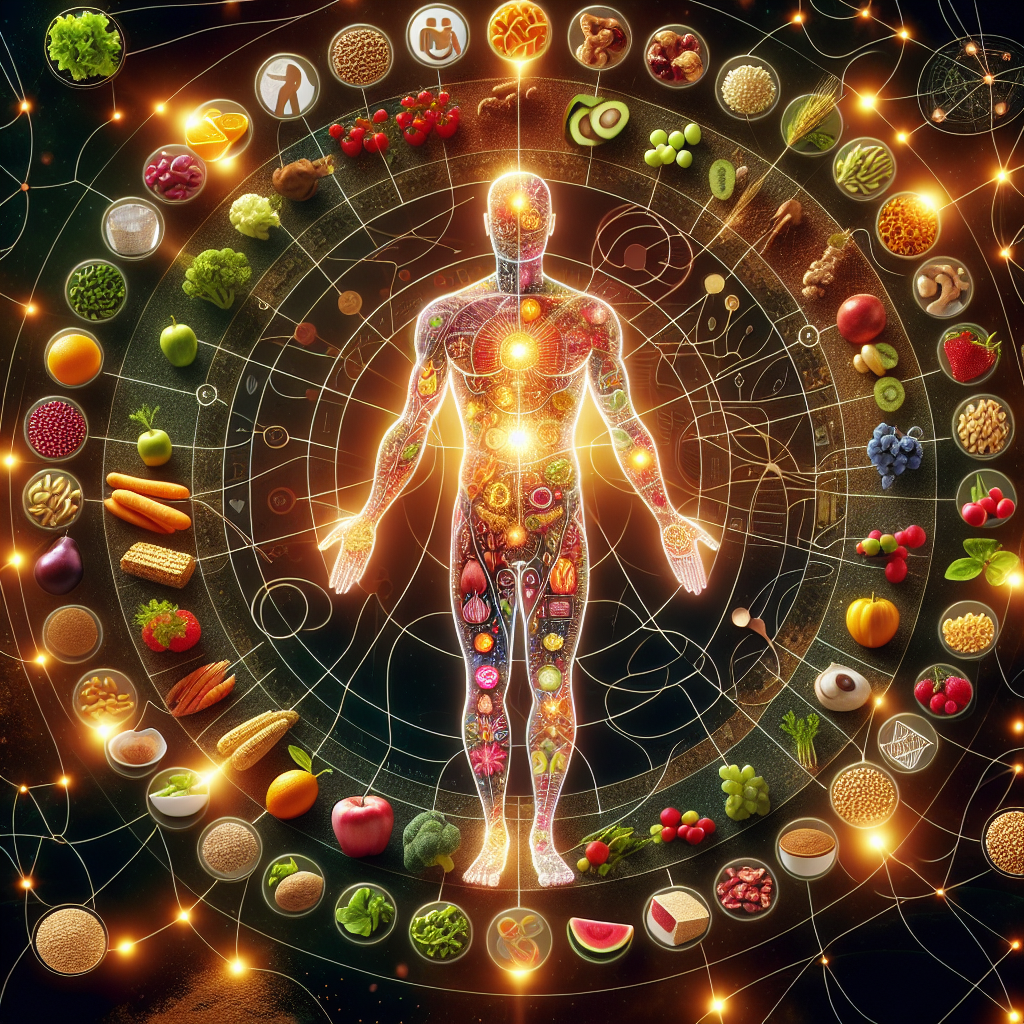Holistic Health Through Human Design and Nutrition

Discover the power of holistic health through human design and nutrition. Embrace a healthier, more vibrant lifestyle today. Visit www.myvibrantvitality.com to start your journey.
Exploring the Connection Between Human Design and Holistic Health
Holistic health is a comprehensive approach to wellness that considers the whole person — body, mind, spirit, and emotions — in the quest for optimal health and wellness. It is a lifestyle approach that goes beyond merely eliminating symptoms and seeks to help individuals achieve a higher level of wellbeing. One of the ways to achieve this is through understanding our unique human design and aligning it with proper nutrition.
Human Design is a system that combines elements of astrology, the I Ching, Kabbalah, Hindu-Brahmin chakra model, and quantum physics to provide a unique and specific ‘design’ of how an individual is energetically designed to interact with the world. It offers profound insights into our psychology, along with strategies and techniques for making decisions that align with our true nature. By understanding our human design, we can live a life that is in harmony with who we truly are, leading to a state of health and wholeness.
On the other hand, nutrition plays a vital role in holistic health. The food we consume can either enhance our health or contribute to disease. A balanced diet rich in fruits, vegetables, lean proteins, and whole grains can provide the body with the nutrients it needs to function optimally. Moreover, understanding our unique nutritional needs can help us make better food choices that support our overall health.
The connection between human design and nutrition is a fascinating one. According to human design theory, each of us has a unique design that determines how we best digest food. This is known as our ‘digestion’ or ‘dietary regimen.’ For example, some people are designed to eat in a calm environment, while others may need stimulation like conversation or music to digest their food properly. Some people may need to eat small, frequent meals, while others do best with fewer, larger meals. By understanding our unique dietary regimen, we can make food choices and create eating environments that support our digestion and overall health.
Furthermore, human design can also provide insights into our unique health challenges and strengths. For example, some people may be prone to certain health issues due to their design. By understanding these potential challenges, we can take proactive steps to support our health, such as eating a diet that supports our specific needs, incorporating regular exercise, and managing stress.
In addition, human design can also help us understand our emotional and mental health. Our design can reveal how we best process emotions, how we think, and how we can best manage stress. This understanding can guide us in creating a lifestyle that supports our mental and emotional wellbeing.
In conclusion, the integration of human design and nutrition offers a powerful tool for holistic health. By understanding our unique design and aligning it with proper nutrition, we can create a lifestyle that supports our physical, mental, emotional, and spiritual health. This approach empowers us to take charge of our health and live a life of wellness and vitality. It is a journey of self-discovery and self-care that leads to a deeper understanding of ourselves and our health. By embracing our unique human design and nourishing our bodies with the right foods, we can achieve holistic health and live in harmony with who we truly are.
Incorporating Nutrition into Your Human Design for Optimal Wellness

Holistic health is a comprehensive approach to wellness that considers the whole person — body, mind, spirit, and emotions — in the quest for optimal health and wellness. One of the ways to achieve this is through the integration of human design and nutrition. Human design is a system that provides a blueprint of the unique configuration of our energy field, while nutrition is the science that interprets the interaction of nutrients and other substances in food in relation to maintenance, growth, reproduction, health, and disease of an organism.
The concept of human design is based on the premise that each of us has a unique energy blueprint that determines our strengths, weaknesses, and potential for growth. This blueprint is influenced by a variety of factors, including our genetic makeup, environmental influences, and personal experiences. By understanding our human design, we can make more informed decisions about our health and wellness, including our nutritional needs.
Nutrition plays a crucial role in our overall health and well-being. It provides the building blocks for our bodies to function optimally and supports our immune system, energy levels, and cognitive function. However, the nutritional needs of each individual can vary greatly, depending on their unique human design. For instance, some people may require more protein in their diet, while others may need more carbohydrates or fats.
Incorporating nutrition into your human design involves understanding your unique energy blueprint and tailoring your diet to support your specific needs. This can be achieved by working with a nutritionist or health coach who is familiar with the principles of human design. They can help you identify your nutritional needs and develop a personalized diet plan that supports your overall health and wellness.
One of the key benefits of incorporating nutrition into your human design is that it can help you achieve optimal wellness. By eating a diet that is tailored to your unique needs, you can support your body’s natural healing processes, boost your energy levels, and improve your cognitive function. Additionally, it can help you prevent chronic diseases and improve your quality of life.
Moreover, incorporating nutrition into your human design can also support your mental and emotional health. Certain nutrients, such as omega-3 fatty acids and B vitamins, are known to support brain health and mood. By ensuring that your diet includes these nutrients, you can support your mental and emotional well-being.
In conclusion, the integration of human design and nutrition offers a holistic approach to health and wellness. By understanding your unique energy blueprint and tailoring your diet to your specific needs, you can support your physical, mental, and emotional health and achieve optimal wellness. Whether you’re looking to boost your energy levels, improve your cognitive function, or prevent chronic diseases, incorporating nutrition into your human design can provide a powerful tool for achieving your health and wellness goals.
The Role of Human Design in Shaping a Holistic Nutrition Plan
Holistic health is a comprehensive approach to wellness that considers the whole person — body, mind, spirit, and emotions — in the quest for optimal health and wellness. It is a lifestyle approach that goes beyond the treatment of symptoms to address the underlying causes of illness. One of the key components of holistic health is nutrition, which plays a crucial role in maintaining our overall health and well-being. However, the concept of nutrition is not one-size-fits-all. Each individual has unique nutritional needs, which can be determined through a system known as Human Design.
Human Design is a synthesis of ancient wisdom and modern science that provides a practical tool for understanding ourselves and others. It combines elements of astrology, the I Ching, Kabbalah, Hindu-Brahma chakra model, and quantum physics to create a unique genetic blueprint of an individual. This blueprint, or BodyGraph, reveals your unique nature, capabilities, and challenges, including your nutritional needs.
The Human Design system recognizes that each of us has a unique digestive profile, which is determined by our design. This profile provides insights into what, when, and how we should eat to optimize our health. For instance, some people are designed to eat small meals throughout the day, while others function best with larger meals at specific times. Some people thrive on a vegetarian diet, while others need a balance of plant and animal foods. By understanding our unique digestive profile, we can make more informed choices about our diet and nutrition, leading to improved health and well-being.
However, understanding our unique nutritional needs through Human Design is just the first step. Implementing these insights into a holistic nutrition plan is the next crucial step. A holistic nutrition plan is not just about what we eat, but also about how we eat. It considers factors such as the quality of our food, our eating environment, and our mental and emotional state while eating. It recognizes that our relationship with food is just as important as the food itself.
For instance, if your Human Design indicates that you are sensitive to your environment, you might benefit from eating in a calm and peaceful setting. If your design suggests that you are influenced by the people around you, you might find it beneficial to eat with others who share your commitment to healthy eating. If your design shows that you are prone to emotional eating, you might need to develop strategies to manage your emotions and maintain a healthy relationship with food.
In conclusion, Human Design offers a unique and personalized approach to nutrition. It provides valuable insights into our unique nutritional needs, which can be incorporated into a holistic nutrition plan. By understanding and honoring our unique design, we can make more informed choices about our diet and nutrition, leading to improved health and well-being. However, it’s important to remember that Human Design is just one tool in the holistic health toolbox. It should be used in conjunction with other health practices and professional medical advice to create a comprehensive and personalized approach to health and wellness.